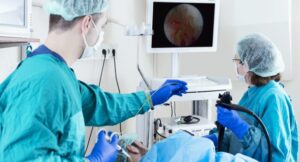
Having a bulky jawline or a square-shaped face can be a source of self-consciousness for many individuals. This facial feature is often a result of genetics, but can also be caused by certain lifestyle habits such as teeth grinding and chewing gum. In addition, changes in body weight and age can also contribute to a bulky jawline.
Fortunately, there are non-surgical face slimming treatments available for those looking to achieve a more slimmed-down facial appearance.
In this blog post, we will delve deeper into the causes of bulky jaws and explore the various non-surgical cosmetic treatments available for face slimming. We will discuss how each treatment works, their potential risks and benefits, and what to expect during and after the procedure.
Causes of Bulky Jaws
Overdeveloped Jaw Muscles From Chewing
One potential cause of bulky or overdeveloped jaw muscles is excessive chewing. This is often seen in individuals who frequently chew gum, eat tough or chewy foods, or clench their jaw. Over time, these repetitive movements can cause hypertrophy or enlargement of the masseter muscles, which are responsible for chewing. While this condition is not harmful, it can lead to a wider or bulkier appearance in the lower face, which may be undesirable for some individuals.
Enlarged Masseter Muscles From Stress
Enlarged masseter muscles from stress is a common cause of bulky jaws, also known as square jaw syndrome. The masseter muscles are located on the sides of the jaw and are responsible for chewing and clenching the jaw. Stress and tension can cause these muscles to become overworked, leading to hypertrophy or enlargement. This can result in a more prominent jawline, giving the appearance of a wider or bulky jaw.
Hormonal Changes And Genetics
One of the main causes of bulky jaws is hormonal changes and genetics. Some people are genetically predisposed to having a wider jawline or overdeveloped masseter muscles, which can make the face appear wider and more bulky. Additionally, changes in hormones, such as an increase in testosterone, can also lead to the development of bulky jaws. While this may be a natural occurrence, it can be a source of self-consciousness for some individuals.
Effective Face Slimming Treatments in Singapore
Btx Injections
Bulky jaws are caused by an overactive masseter muscle, which is responsible for chewing and clenching. This can lead to a square-shaped face, making some individuals feel self-conscious about their appearance. One non-surgical cosmetic treatment for face slimming is BTX injections, which is a form of botulinum toxin type A.
The injections work by temporarily relaxing the masseter muscle, reducing its size and creating a more tapered jawline. This treatment is minimally invasive, with no downtime needed, and results can last up to six months. However, it is important to note that this treatment should only be administered by a licensed and trained healthcare professional. Patients should also be aware of potential side effects such as temporary weakness in the jaw muscle and difficulty chewing.
Dermal Fillers
Dermal fillers have become increasingly popular for contouring the face, including slimming bulky jaws. This non-surgical face slimming treatment involves injecting a gel-like substance, such as hyaluronic acid, into specific areas of the face to add volume, smooth out wrinkles and fine lines, and improve overall facial symmetry. For slimming the face, the filler can be injected along the jawline to create a more defined and chiseled look. The results of dermal fillers for contouring are immediate and can last up to a year or more, depending on the type of filler used.
Thread Lift
Thread Lift is a popular non-surgical cosmetic treatment for face slimming and jawline contouring. The procedure is relatively painless, and there is minimal downtime. The results of Thread Lift can last for up to 18-24 months, depending on the individual and the technique used. It is important to note that Thread Lift is not suitable for everyone, and a consultation with a qualified cosmetic surgeon is recommended to determine if this treatment is appropriate.






